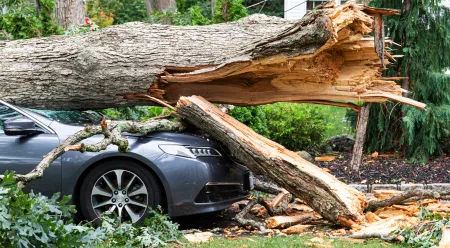Have you ever been in a car accident before?
If so, you know how scary (and expensive) it can be. Thankfully, many Canadian drivers know what to do after an accident, like a fender-bender or broken headlight.
Unfortunately, few Canadian drivers know how to handle the nuances of more complex situations, like a significant collision. After a major auto incident, like a t-bone or high-speed head-on collision, your vehicle may be deemed a write off. If you're unfamiliar with how a write off is determined or what to do afterward, be sure to continue reading.
START A QUOTE
Why and when is a car written off by insurance company in Canada?
For those who aren't familiar with the term, a "write off" is insurance jargon for a vehicle that has either been deemed damaged beyond repair or a car that would cost more to repair than its actual cash value.
As an example, if a vehicle has an actual cash value of $3,000 but costs $4,500 to repair, your insurance company will consider the car a write off.
Our team considers several factors while determining the actual cash value of a vehicle. Some of these factors include:
- The year and make of the vehicle
- The model
- Parts required to fix and maintain vehicle, along with modifications made post-purchase (more on that detail shortly)
- Value of similar vehicles in your area
- Accrued kilometres
For instance, an older vehicle with hundreds of thousands of kilometres and no recent upgrades would likely have a lower actual cash value of a brand-new luxury vehicle with high-end modifications. This is an important piece of information that Canadian drivers need to understand.
How common are vehicle write offs in Canada?
Although Canadian roads are relatively safe, collisions resulting in write offs are still commonplace, especially in busy towns and cities.
According to a recent study, approximately 17% of auto-related collisions in Canada result in a vehicle write off.
What happens when insurance writes off a car?
If you've recently written off a car, then you have a handful of ways to go about the situation.
Agree or disagree with your insurance company's settlement offer
As mentioned earlier, your insurance company needs to determine the actual cash value of your car before the incident. This allows them to make a settlement offer if the vehicle is deemed a write off.
If you accept your insurance provider's settlement offer, you'll be required to fill out the necessary paperwork and will receive the agreed upon financial coverage shortly.
On the other hand, if you disagree with your insurance provider's settlement offer, you have the right to fight it. If you choose to fight the settlement offer, you'll be required to provide proof of the purchases that you believe increase the vehicle's actual cash value. The easiest way to do this is to supply your insurance company with receipts.
Some modifications that may influence the actual cash value of your vehicle include the following:
- Additional or replacement parts (motor, brakes, etc.)
- Aesthetic changes (paints jobs, tints, etc.)
- Suspension upgrades
- Interior upgrades (sport seats, premium air conditioner, etc.)
However, it's imperative for Canadian drivers to remember that even if they have proof of specific modification purchases, insurance providers are the ones who determine if they increase the value of the vehicle. Be sure to keep this in mind when tallying up your receipts.
If we find that we've accidentally overlooked a particular expense or detail, we'll promptly adjust the settlement offer to the correct amount. We value our customers and always aim to provide the highest level of objectivity while conducting vehicular assessments.
Getting your vehicle back for your insurance provider
Whether you want to scrap it for parts or it has sentimental value, there are numerous reasons why you may want to keep your vehicle after it's been written off.
Thankfully for those who aren't ready to part ways with their beloved ride, drivers are welcome to repurchase their vehicles from their insurance company, that is, if they act fast enough.
After a vehicle is written off, we look for ways to dispose of it. Taking this step prevents us from paying for storage for long periods. Generally, insurance companies will either auction a vehicle off or sell it directly to a scrapyard.
There is no set time frame for how long we'll keep a written off vehicle, as it depends on the auction process or junkyard's schedule. However, as a rule of thumb, we recommend that you act as quickly as possible if you want to repurchase your vehicle.
Before repurchasing your vehicle, it's important to remember that it may not be driveable in the future. Whether your write off vehicle can ever be seen as roadworthy will depend on its overall condition.
After being written off, a vehicle will be deemed unrepairable or receive what is known as a “salvage title”. A salvage title is a document stating that the vehicle was written off at one point and requires professional care before it can be considered roadworthy. Vehicles with salvage titles often cost more to insure and may even require high-risk auto insurance.
Knowing this, you can see why very few drivers decide to repurchase their vehicles after writing them off; it requires a lot of time, effort and money to make it worthwhile. However, if you enjoy tinkering around with vehicles, a totalled car may seem like an appealing side-project.
How does a vehicle write off affect auto insurance rates?
Writing off a vehicle is stressful enough; the last thing you want to worry about is your insurance rates skyrocketing through the roof.
Thankfully, if you're not deemed at fault, it's unlikely that you'll see a spike in your insurance rates. Alternatively, if you are responsible for the incident, then it's highly likely that your insurance rates will increase.
Not to mention, if you have multiple offences on your driving record, writing off a vehicle can have serious consequences. Drivers in this situation may get dropped by their auto insurance providers, forcing them to look for a new company.
Drive with confidence and knowledge
Before you were asking questions, like “when is a vehicle written off in Canada?” — now, after doing some research, you can teach others how to confidently tackle the car write off process.
If you have any more questions about written off vehicles, feel free to reach out to your insurance provider. Your insurance provider can walk you through your auto insurance policy step by step, helping you understand every minor detail.



